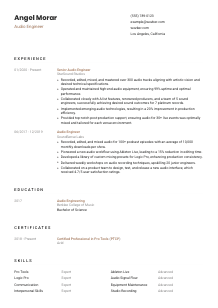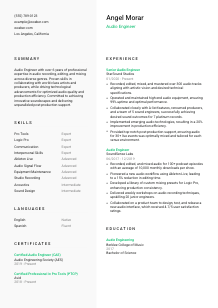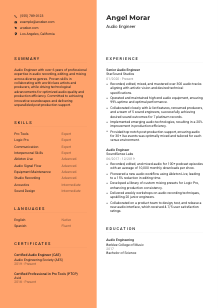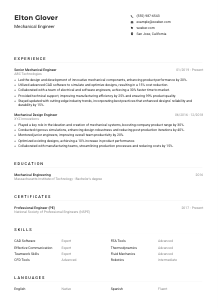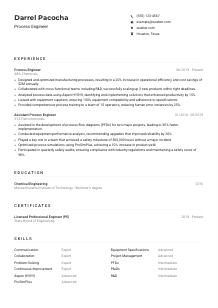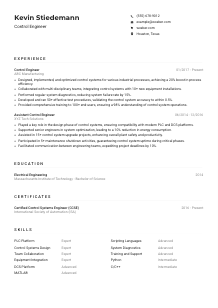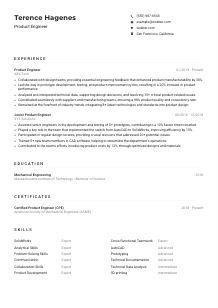Audio Engineer Resume Example
Tweaking soundscapes, but your resume hits a flat note? Sync up with this Audio Engineer resume example, mixed and mastered using Wozber free resume builder. Discover how you can align your sonic skills with job requirements, harmonizing your career journey to flow as smoothly as a well-mixed track!
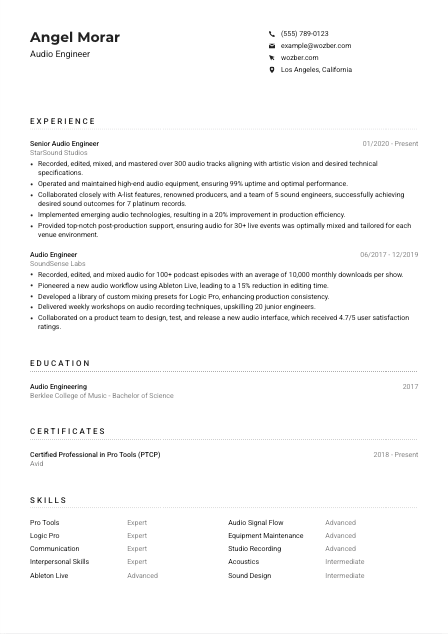
How to write an Audio Engineer Resume?
Hey there, future sonic genius! If you're reading this, you're probably looking to fine-tune your resume so it sings in perfect harmony with the Audio Engineer position you're eyeing. Fear not, because this guide, powered by Wozber's free resume builder, is your backstage pass to crafting a resume that's not just a list of jobs but a chart-topping hit that recruiters can't ignore. Let's turn up the volume on your career narrative and get you ready to land that dream gig!
Personal Details
First impressions count, especially in the creative world of audio engineering. Your personal details section is the 'soundcheck' to your resume's gig, setting the stage for a memorable performance. Here's how to make every detail resonate.
1. Name That Tune
Think of your name as the headline act. Make it bold, make it big, and make sure it's the first thing that captures the audience's (hiring manager's) attention. A well-presented name sets the tone for the rest of your resume.
2. Echo the Role
Right below your name, ensure your desired position, "Audio Engineer", takes center stage. Matching your headline title with the job you're applying for is like hitting the right frequency—it immediately tells the hiring manager, "This is the performance you've been waiting for."
3. Tune Your Contact Info to Perfection
Ensure your contact details are as clear and crisp as a finely mixed track. Use a professional email and double-check for typos—think of it as tuning your instruments before the show starts. Adding your location, especially if it matches the job's requisite ‘Los Angeles, California,' can be like adding that extra bass boost, reinforcing your suitability.
4. Amp Up Your Professional Links
Include a link to your online portfolio or LinkedIn profile. Ensure your profiles are harmoniously synced with your resume content. This gives recruiters a chance to see your work in action, adding depth to your resume's soundstage.
5. Control the Volume on Personal Info
Remember, this isn't a personal interview just yet, so keep details like age or marital status on mute. Focus on tuning your resume to the job's frequency, ensuring every bit of information makes your professional capabilities louder.
Takeaway
With your personal details fine-tuned to perfection, you've set the stage for a memorable resume. Remember, this section is your opening riff, the first chance to grab the hiring manager's attention. Make it count!





Experience
Your experience section is your setlist—it's where you show off your greatest hits. Let's make sure each track (job) contributes to a performance (resume) that'll have employers begging for an encore.
- Recorded, edited, mixed, and mastered over 300 audio tracks aligning with artistic vision and desired technical specifications.
- Operated and maintained high‑end audio equipment, ensuring 99% uptime and optimal performance.
- Collaborated closely with A‑list features, renowned producers, and a team of 5 sound engineers, successfully achieving desired sound outcomes for 7 platinum records.
- Implemented emerging audio technologies, resulting in a 20% improvement in production efficiency.
- Provided top‑notch post‑production support, ensuring audio for 30+ live events was optimally mixed and tailored for each venue environment.
- Recorded, edited, and mixed audio for 100+ podcast episodes with an average of 10,000 monthly downloads per show.
- Pioneered a new audio workflow using Ableton Live, leading to a 15% reduction in editing time.
- Developed a library of custom mixing presets for Logic Pro, enhancing production consistency.
- Delivered weekly workshops on audio recording techniques, upskilling 20 junior engineers.
- Collaborated on a product team to design, test, and release a new audio interface, which received 4.7/5 user satisfaction ratings.
1. Read the Crowd
First off, dissect the job description. Highlight keywords like "audio recording", "sound editing", and "mixing/mastering". These are the tracks you want to play up in your setlist (your experience section).
2. List Your Headline Acts
Structure your roles with the venue (company name), your title (like lead guitarist, but for audio), and the dates of your tour (employment period). Make it easy for the hiring manager to see the progression of your career.
3. Hit Them with Your Best Riffs
For each role, compose powerful accomplishment statements that resonate with the job description. Did you mix and master over 300 audio tracks? That's a platinum record-worthy achievement. Quantify your accomplishments to make your impact clear.
4. Keep Your Solos Short
While it's tempting to list all your achievements, focus on the ones most relevant to the job you're applying for. Tailor your experience like a custom mix, ensuring every beat and note contributes to the overall sound.
5. Don't Just Play Covers
Showcase your versatility by highlighting experiences that demonstrate your unique skills and contributions. Were you instrumental in optimizing studio workflow, or did you play a key role in live sound mixing? These are the solos that make you stand out.
Takeaway
After tuning your experience section, you're ready to leave the hiring managers wanting more. This is your professional performance history; make it clear, concise, and compelling. Ready for the next track?
Education
The education section of your resume is like the foundational rhythm section of a band. It might not always get the limelight, but it's essential for keeping everything in time. Let's ensure your academic credentials hit the right note.
1. Identify Your Musical Genre
Pinpoint the educational essentials from the job posting. A "Bachelor's degree in Audio Engineering, Music Production, or a related field" is like specifying you need a bassist proficient in funk—you want to ensure you're showing you know the genre inside out.
2. Set Up Your Stage
Layout your educational background clearly—degree, institution, graduation date. It's akin to setting up your stage before the performance, ensuring everything's where it needs to be.
3. Highlight Your Solo Performances
Did your education involve specialized coursework or projects that directly tune into what the job requires? Mention these details. It shows you've not only attended the school of rock but you've also mastered the solos.
4. Show Off Your Band Memberships
Were you part of an audio engineering club or music production group? These experiences can amplify your qualifications, showing you've been engaged and proactive in your field beyond the classroom.
5. Keep the Tempo
For those more seasoned in their careers, the education section might be a brief backtrack to your origins. Keep it concise and focused on the essentials, letting your professional experience take the lead solo.
Takeaway
With your education section set to rhythm, your resume is starting to sound like a hit record. This section backs up your expertise with the theoretical knowledge you've gained. Let's keep the rhythm going.
Certificates
Your certificates are like the special guest appearances on your album—they add credibility and can be a highlight of your resume. Let's ensure your certifications hit the high notes.
1. Scan the Festival Lineup
Review the job posting for any specific mentions of required certificates. In our scenario, the job doesn't specify, but adding relevant certification, like "Certified Professional in Pro Tools", can give you an edge.
2. Feature the Headliners
Focus on certs that are most relevant to the job. Leading with your Pro Tools certification signals to employers that you're not just a member of the band, you could lead the band.
3. Keep Your Passes Up-to-Date
Make sure to include the dates of your certifications to show they're current. Think of it as proving your backstage pass hasn't expired—you're still fully credentialed to be part of the show.
4. Stay on Top of the Charts
The tech and trends in audio engineering evolve fast. Continuing education and updating your certifications show that you're committed to staying relevant in the industry. It's like constantly dropping hit singles to stay at the top of the charts.
Takeaway
With your certifications section fine-tuned, your resume is really starting to rock. These qualifications are your proof of ongoing dedication and expertise in the field. Alright, let's turn up the bass with your skills section next!
Skills
Your skills section is the synthesizer of your resume. It can add unique textures and layers, making your application stand out. Let's dial in the settings to produce a sound that's both complex and compelling.
1. Distill the Essence
First things first, break down the job posting to identify core skills—both technical and soft—like proficiency in Pro Tools, Logic Pro, and the ability to collaborate effectively. These are your synth presets, crucial for creating the right sound.
2. Arrange Your Tracks
Align your skills in order of relevance to the role. Spotlight your technical proficiencies in audio software at the top, followed by your outstanding interpersonal and communication abilities. It's about setting up the mix so every skill shines.
3. Cut the Noise
Resist the temptation to list every skill you've ever learned. Focus on what's most relevant to the job at hand. Filtering out the background noise ensures your key strengths come through loud and clear.
Takeaway
With your skills finely tuned and clearly showcased, your resume is sounding better than ever. These are the abilities that can really make you stand out from the crowd. Ready for the final touch? Let's craft a compelling summary.
Languages
In the global concert of the job market, speaking multiple languages can be like being able to play multiple instruments—it significantly broadens your appeal. Let's ensure your linguistic abilities are harmoniously highlighted.
1. Review the Venue Specs
First, check the job listing for any specific language requirements. Our job asks for
- Strong English language communication abilities.
2. Showcase Your Headlining Language
If like our example, the job specifies a required language, ensure it's front and center in your languages section, with a clear indication of your fluency level.
3. List Your Opening Acts
Even if not directly required for the job, your additional language skills can set you apart, showing diversity and the ability to communicate in different cultural contexts. Just like being able to cover songs in multiple genres can make a band more versatile and appealing.
4. Be Honest About Your Range
Accurately describe your language proficiency levels, from native to basic understanding. It's important to set realistic expectations, just like you wouldn't claim to be a virtuoso on an instrument you're just learning.
5. Understand the Gig
Tailor the language section to the specifics of the role. For roles that require interaction with international teams or clients, highlighting your multilingual abilities can be a standout feature, akin to a band's international appeal.
Takeaway
With your language skills finely tuned and showcased, you're signaling that you're ready for the global stage. These abilities enhance your appeal, adding depth and versatility to your professional persona. The set's almost complete; let's hit the spotlight with your summary.
Summary
The summary is the demo track of your resume. It gives the audience (hiring managers) a taste of your sound before they dive into the full album. Let's craft it to be catchy, memorable, and reflective of your unique talents.
1. Tune Into the Role
Start by immersing yourself in the job description. Feel the rhythm of the role and what's expected. This understanding is your metronome, keeping your summary in time with what the hiring manager's looking for.
2. Lead With Your Theme
Introduce yourself with a statement that captures the essence of your professional identity. Are you a 'sound sculptor with over 6 years of experience'? This opening line sets the stage for what's to come.
3. Highlight Your Hits
Now's the time to showcase your top skills and major accomplishments. Just like a greatest hits album, pick the achievements that will grab attention and make the audience want more.
4. Keep It Tight
Aim for a length that's just right—not too long, not too short. A tight, impactful summary leaves the reader eager to dive deeper into your resume, just like a well-produced demo encourages them to check out the full album.
Takeaway
Congratulations, superstar! Your resume is now a finely curated showcase of your skills, experience, and the unique sound you bring to the audio engineering role. It's time to take this show on the road. Remember, your resume is the key to unlocking new stages in your career. Fine-tune it, let it reflect your unique flair, and let Wozber's free resume builder, including the use of an ATS-friendly resume template and ATS optimization tools, be your roadie on this tour. You're ready to headline. Go make your mark on the world!
Launching Your Audio Engineer Journey
Bravo on reaching the final stage of this exploration! Armed with these insights, you're now poised to craft an Audio Engineer resume that not only checks the boxes but truly resonates with hiring managers. Your resume is your story. Fine-tune it, imbue it with your unique flair, and let it be the steppingstone to your next big role. The world awaits your brilliance. Go forth and make your mark!

- Bachelor's degree in Audio Engineering, Music Production or a related field.
- Minimum of 3 years experience in audio recording, sound editing, and mixing/mastering.
- Proficiency with industry-standard audio software such as Pro Tools, Ableton Live, and Logic Pro.
- Strong understanding of acoustics, audio signal flow, and various audio equipment.
- Excellent communication and interpersonal skills to collaborate effectively with artists, producers, and other team members.
- Strong English language communication abilities necessary.
- Must be located in Los Angeles, California.
- Record, edit, mix, and master audio tracks in line with the artistic direction and technical specifications.
- Operate and maintain audio equipment, ensuring optimal performance and quality.
- Collaborate closely with artists, producers, and other team members to achieve desired sound outcomes.
- Stay updated with emerging audio technologies and industry trends, implementing them where appropriate.
- Provide post-production support for live events, ensuring the audio is mixed and optimized for each environment.





